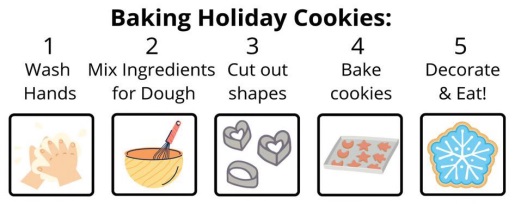HOLIDAY MODE : PROVIDING STRUCTURE AND MANAGING STRESS
In addition to family gatherings, and unstructured days, some families have guests staying at their home or plan to travel to visit others' homes. If you're worried about how you can help your child manage stress through the holidays, here are a few tips to help you provide structure during this season!
1. PLAN WHAT YOU CAN
If you have a calendar of the activities, gatherings, and holiday travel your family has planned, start early and create simple schedules that you can share with your child.
Use visuals or pictures on the schedule to represent different activities and locations. You could also make a countdown tracker and/or calendar for each of the big activities, and encourage your child to check off each day leading up to the event or update the countdown tracker.
Knowing about an event or gathering in advance can help reduce stress caused by surprise visits or activities during the holiday season. There may still be unplanned activities that arise, but preparing in advance as much as possible, can help ease your child's anxiety.
2. PREPARE MINI-SCHEDULES
Break holiday activities into more manageable tasks and routines. As you are preparing for an activity, such as baking holiday cookies, try breaking up the activity into smaller steps.
Use visual representations, pictures, or words (depending upon your child's preferred method of communication) to describe each step in the order in which it should be completed. We've included an example of a mini-schedule for reference!

Breaking down activities and tasks can make them seem more approachable for your child, and can help prevent them from getting overwhelmed. As you complete each step in the mini-schedule, encourage your child to check it off the list or, if you're using visuals with hook-and-loop adhesive, remove each visual as the step is completed.
Giving your child a way to interact directly with the schedule affords them a sense of control as well as providing them a concrete way to mark the passage of time, which can be an abstract concept for some children.
3. USE SOCIAL STORIES
Set expectations for what will happen during a particular holiday event or activity. A social story is a simple explanation of a social situation or activity and includes behavioral expectations and potential outcomes of the situation.
In the story, focus on the social cues your child should pay attention to and the order in which events or social interactions may occur. Read through the story with your child several times before the family gathering or activity, so they are prepared in advance.
The goal is to walk your child through a specific situation, explaining potential interactions they may experience, as well as possible outcomes, in an effort to reduce surprises that may be upsetting or disruptive.
3. PROVIDE STRUCTURED CHOICE OPTIONS
During the hustle and bustle of the holidays, your child may feel like they've lost the autonomy to make decisions within their environment. Giving your child options can help them feel as though they are more in control over their surroundings.
Offering structured choice options means that you, the parent or caregiver, provide your child with a limited number of options to choose from, within a given situation. For example, rather than asking your child, 'would you like a snack?' which could lead to any number of responses, try instead, 'would you like carrots or grapes for a snack?'.
By limiting the options, you can help steer your child towards appropriate behaviors or more positive choices, while giving them the power to choose their course of action.
This strategy can also be used as a way to divert challenging behaviors. During the holidays, many families will sit down to share a meal together. Some children do not enjoy the experience and would much rather play with their toys or watch a movie! Instead of telling your child, 'no, you may not play with your toys, you need to sit down with the family,' try instead to offer them structured choices.
For example, ‘after you’ve finished eating, would you rather play with your toy cars or build a puzzle?’. Continue to offer structured choices throughout the meal (‘would you like green beans or corn with your meal?’) to keep their attention focused on making decisions, rather than on their desire to play instead of eat dinner.
RESOURCE LINKS
The Watson Institute helps children with special needs achieve their fullest potential in all aspects of their lives. thewatsoninstitute.org/watson-life-resources/situation/strategies-fami-ly-gatherings-community-setting/
ABOUT THE AUTHOR:
The holidays can be an overwhelming time for everyone, particularly for parents and caregivers. By taking some time to prepare before the holiday season begins, you can reduce your own stress, as well as that of your child! •
Andrea Morris, M.Ed. has more than 30 years of experience in special education and works as an educational consultant for the Watson Institute. She has a Masters of Education and M/PH Certification to work with students with mental or physical disabilities from the University of Pittsburgh. In her current role, Andrea provides training and consultation to educational teams serving students with disabilities in a variety of educational settings. Her areas of expertise include: autism and related disorders, inclusive practices, positive behavior support, naturalistic and structured teaching strategies. Prior to her work at Watson, Andee was an Early Childhood Consultant for the Early Learning Institute, Developmental Specialist for LEAP Preschool and a Head Teacher for North Area Preschool. She has authored several journal articles and is a skilled presenter.